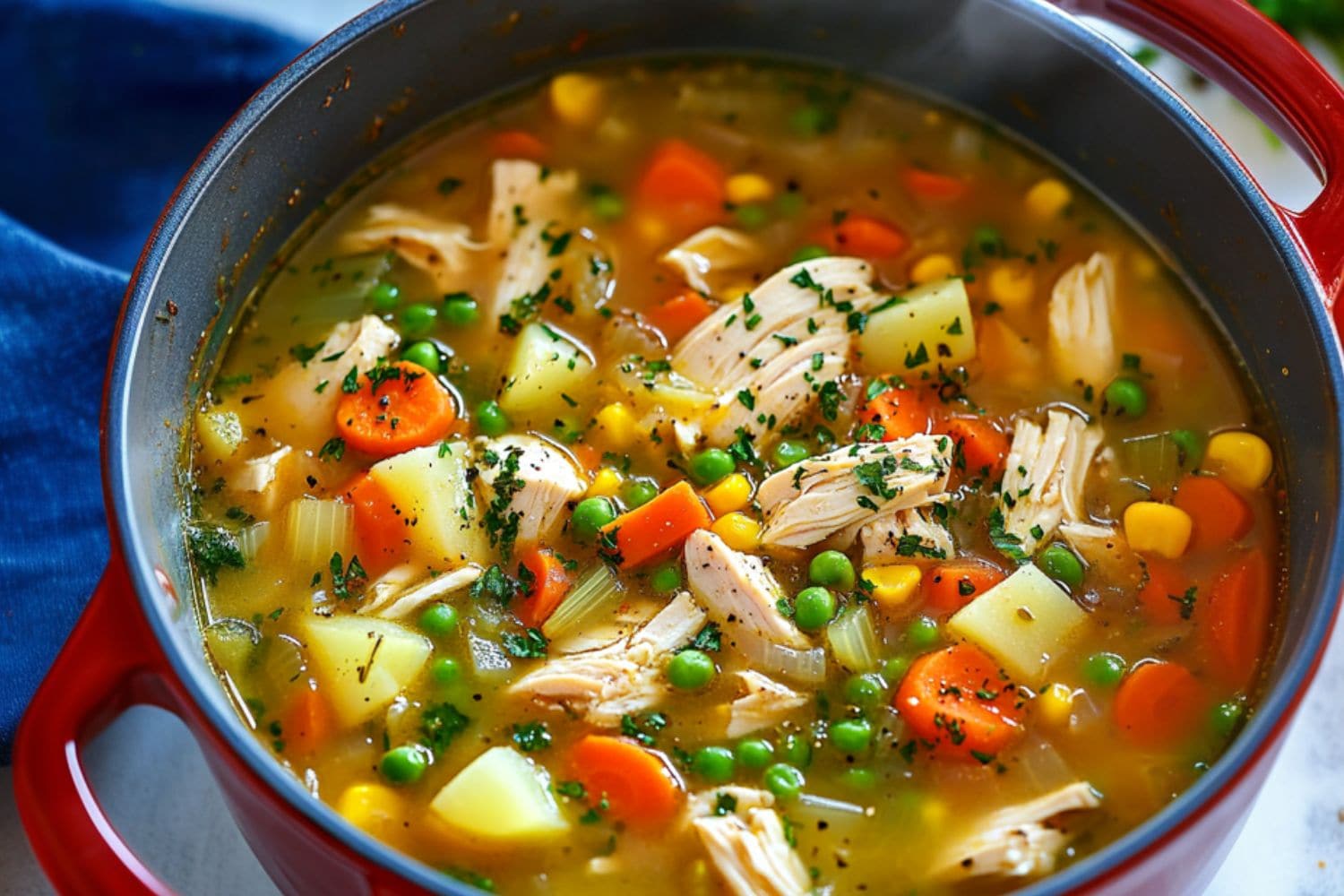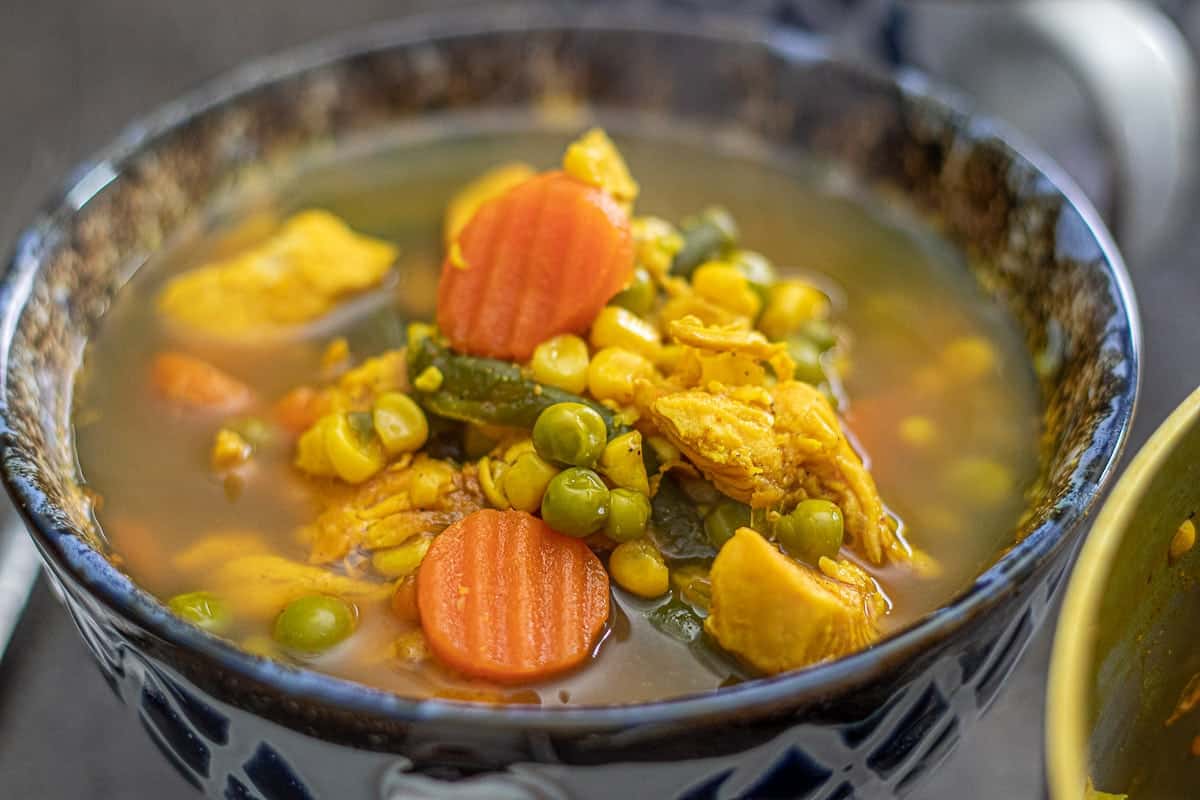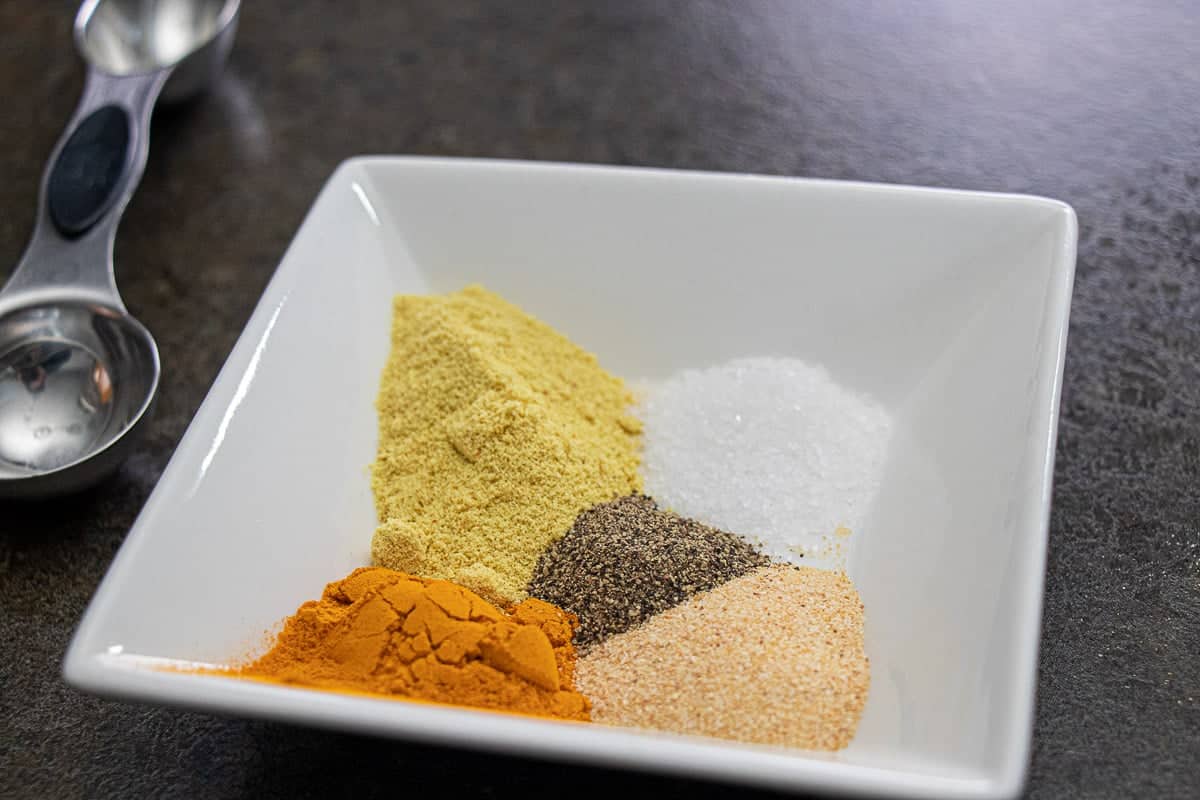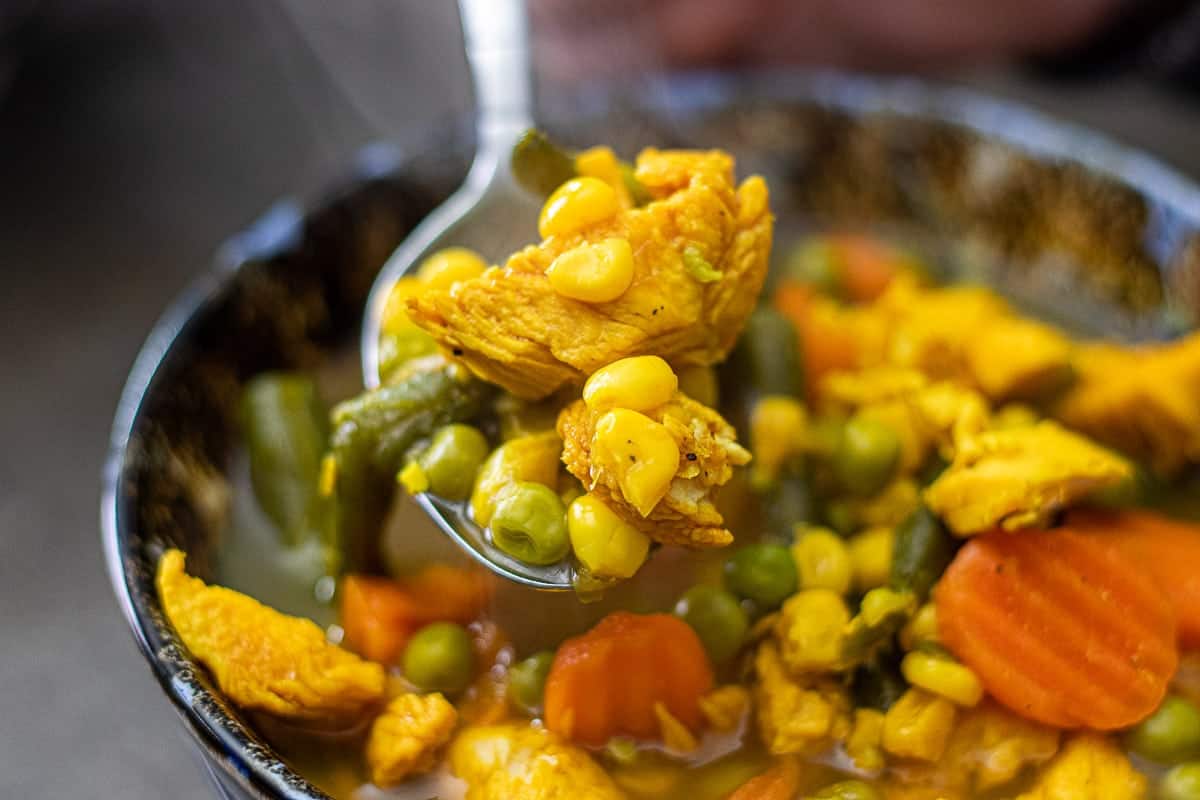Looking for a warm, comforting meal that won’t break your calorie bank? Chicken vegetable soup might be just what you need. I’ve done the research on this popular comfort food to give you the full scoop on its nutritional profile.
Quick Answer: Calories in Chicken Vegetable Soup
According to multiple reliable sources, a standard 1-cup serving of chicken vegetable soup contains approximately 134 calories. This makes it an excellent option for those watching their caloric intake while still wanting something satisfying and nutritious.
Detailed Nutritional Breakdown
Let’s dive deeper into what makes up those 134 calories in a typical cup of chicken vegetable soup
| Nutrient | Amount per Cup | % Daily Value* |
|---|---|---|
| Total Fat | 3.96g | 5% |
| Saturated Fat | 1.062g | 5% |
| Monounsaturated Fat | 1.522g | – |
| Polyunsaturated Fat | 0.896g | – |
| Cholesterol | 35mg | 12% |
| Sodium | 412mg | 18% |
| Total Carbohydrate | 10.92g | 4% |
| Dietary Fiber | 1.3g | 5% |
| Sugars | 4.46g | – |
| Protein | 13.77g | – |
*Based on a 2000 calorie daily diet
The calorie breakdown shows an impressive macronutrient balance:
- 26% from fat
- 33% from carbohydrates
- 41% from protein
This makes chicken vegetable soup a particularly protein-rich option compared to many other soups, which helps with satiety and muscle maintenance.
Vitamins and Minerals
Chicken vegetable soup isn’t just low in calories—it’s also packed with essential vitamins and minerals:
- Vitamin A: 100mcg (11% DV)
- Vitamin C: 12.8mg (14% DV)
- Calcium: 25mg (2% DV)
- Iron: 1.1mg (6% DV)
- Potassium: 414mg (9% DV)
These nutrients support immune function, vision health, bone strength, and proper muscle function—making this soup not just calorie-friendly but genuinely nutritious.
Why Chicken Vegetable Soup Is Diet-Friendly
At just 134 calories per cup, chicken vegetable soup represents only about 7% of a standard 2,000-calorie daily diet. This leaves plenty of room for other foods while still feeling satisfied.
The folks at Belly Laugh Living describe their homemade chicken vegetable soup as “diet-friendly comfort food,” noting that a larger two-cup serving still contains less than 300 calories (approximately 249 calories according to their recipe).
What makes this soup particularly suitable for weight management:
- High water content – Helps you feel full with fewer calories
- Lean protein – The chicken provides satiety without excessive calories
- Fiber from vegetables – Contributes to fullness and digestive health
- Customizable – Can be adapted to include more or different vegetables based on preference
Homemade vs. Store-Bought: Calorie Comparison
It’s worth noting that calorie counts can vary significantly between homemade and commercial soups. While a generic cup of chicken vegetable soup averages 134 calories, homemade versions might differ based on ingredients used.
The Belly Laugh Living recipe, for example, calculates about 249 calories for a two-cup serving (so approximately 125 calories per cup), which is slightly lower than the generic average. This is likely due to their specific ingredient choices and proportions.
Store-bought soups often contain added sodium, preservatives, and sometimes additional fats or thickeners that can impact the calorie count. Always check the nutrition label if purchasing prepared soups.
Making Your Soup Even More Calorie-Friendly
If you’re making your own chicken vegetable soup and want to reduce the calories even further, try these tips:
- Use skinless chicken breast instead of dark meat
- Skim fat from homemade broth
- Load up on non-starchy vegetables like celery, green beans, and zucchini
- Limit or omit starchier ingredients like potatoes, corn, or pasta
- Use herbs and spices rather than oil for flavor
- Try using less sodium chicken broth to reduce water retention
Perfect Portions for Weight Management
The portioning strategy mentioned by Belly Laugh Living is brilliant for weight management: measuring out individual portions after cooking and storing them in pre-portioned containers. This makes it easy to grab a quick meal while knowing exactly how many calories you’re consuming.
When using chicken vegetable soup as part of a weight management plan, consider:
- Using it as a starter to reduce overall meal consumption
- Making it a complete meal by having a larger portion (2 cups) with a small whole grain roll
- Adding it to your weekly meal prep routine for easy, healthy lunches
Common Questions About Chicken Vegetable Soup Calories
Is chicken vegetable soup good for weight loss?
Yes! With just 134 calories per cup on average, chicken vegetable soup is an excellent option for those looking to manage their weight. It’s filling, nutritious, and can help satisfy hunger without excessive calories.
How does chicken vegetable soup compare to other soups calorie-wise?
Chicken vegetable soup is generally lower in calories than creamy soups like potato, broccoli cheese, or bisques. It’s comparable to other broth-based soups but often provides more protein than plain vegetable soup.
Does the recipe or brand affect calorie count?
Absolutely. Homemade soups can range from about 125-250 calories per cup depending on ingredients used. Commercial brands vary widely, with some “chunky” or “hearty” varieties containing significantly more calories due to additional ingredients like cream, butter, or oils.
Can I eat chicken vegetable soup every day on a diet?
While chicken vegetable soup is nutritious and low in calories, variety is important for obtaining a full spectrum of nutrients. Consider rotating it with other healthy meals rather than consuming it exclusively.
A Practical Example: Weekly Meal Plan Incorporating Chicken Vegetable Soup
Here’s how you might incorporate chicken vegetable soup into a balanced weekly plan:
Monday:
- Lunch: 2 cups chicken vegetable soup (~250-270 calories)
- Side: Small whole grain roll (80-100 calories)
- Total meal: ~350 calories
Wednesday:
- Dinner starter: 1 cup chicken vegetable soup (134 calories)
- Main: Grilled fish with roasted vegetables (350 calories)
- Total meal: ~484 calories
Friday:
- Lunch: 1.5 cups chicken vegetable soup (201 calories)
- Side: Small garden salad with vinaigrette (150 calories)
- Total meal: ~351 calories
Making Your Own Lower-Calorie Chicken Vegetable Soup
I’ve tried many chicken vegetable soup recipes, and I’ve found that the best approach for a truly satisfying but calorie-conscious version includes:
- Starting with a flavorful but clear broth (homemade if possible)
- Using plenty of aromatic vegetables (onions, celery, carrots)
- Adding herbs and spices generously for flavor without calories
- Including lean chicken breast for protein
- Incorporating a variety of colorful vegetables for nutrients and visual appeal
The Belly Laugh Living recipe offers a great example with its use of turmeric, garlic powder, and chicken bouillon for flavor enhancement without adding significant calories.
Beyond Calories: Other Health Benefits
While calorie content is important for weight management, chicken vegetable soup offers numerous other health benefits:
- Hydration – The high water content helps maintain proper hydration
- Immune support – Many ingredients (chicken, vegetables, herbs) contain nutrients that support immune function
- Recovery – The protein and nutrients can aid in recovery during illness
- Digestive health – The fiber from vegetables supports gut health
- Inflammation reduction – Ingredients like turmeric have anti-inflammatory properties
The Bottom Line
At approximately 134 calories per cup, chicken vegetable soup is a nutritional powerhouse that offers a remarkable balance of protein, carbs, and fats while remaining low in calories. Whether you’re actively trying to lose weight or simply maintain a healthy diet, this versatile dish deserves a regular spot in your meal rotation.
Remember, the exact calorie count will vary based on ingredients and preparation methods. Homemade versions typically offer the most control over both nutrition and flavor, allowing you to create a soup that perfectly suits your dietary needs and taste preferences.
So next time you’re craving something warm and comforting but don’t want to sacrifice your dietary goals, reach for a bowl of chicken vegetable soup. Your taste buds—and your waistline—will thank you!

It’s like a hug in a bowl!
Another GREAT thing about this chicken vegetable soup recipe is that it can be made on the weekend to enjoy throughout the week. Its easy to freeze and reheat, as well. All you need to do is:
- After making it, let the soup cool
- Grab a measuring cup
- Pour your serving into a freezer container or zip lock bag (we often put the soup into single-serving portions)
- Seal
- We also write on the bag how many servings, what it is, the number of calories, and the date (this way, you can avoid the old…” what is this” freezer guessing game.)

Having homemade soup on hand for when you feel a cold coming on. Its like a hug from mom. Grandma was right, after all: Chicken soup is good for a cold, not just the soul.

Key to enhancing the flavor in this soup
Sauté the spices in the pan when adding the chicken (raw or cooked). Sauté until chicken is fully cooked, and add the veggies. The aroma of these spices is amazing. We sometimes add roasted garlic if we have any available. This enhances the flavors. Our kitchen smelled so good, and we could hardly wait for the soup to finish.
Add the non-fat chicken broth to the chicken & veggie mixture, bring to a boil, and simmer for 30 minutes.

This recipe will make about 16 cups of soup. We didnt need to add any additional seasoning. It was perfect.
Serve as a main dish or appetizer.


